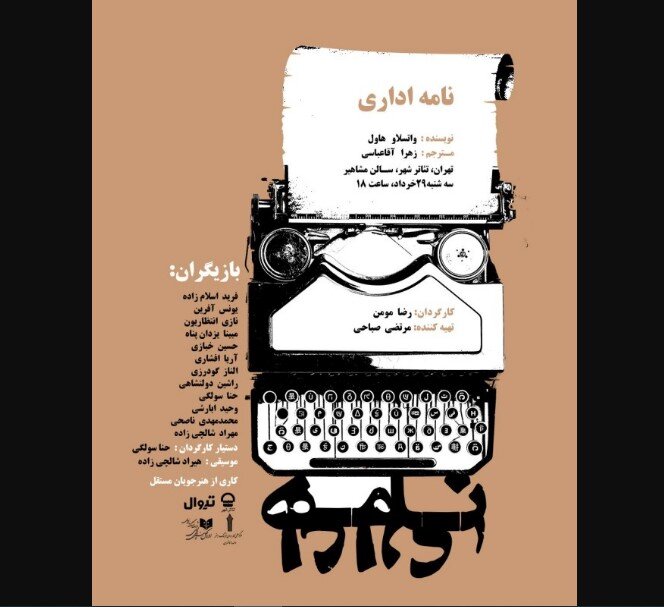Tehran theater to host reading performance of “The Memorandum”

TEHRAN- A group of actors will perform a reading of Czech playwright Vaclav Havel's 1965 play “The Memorandum” at Tehran's City Theater Complex on June 18.
Reza Momen will be the director of the reading performance, which will be read by a cast composed of Farid Eslamzadeh, Yunes Afarin, Nazi Entezariun and Mobina Yazdanpanah.
“The Memorandum” is a satirical black comedy that pokes fun at bureaucracy and conformity. Written in 1965, the play was an ironic commentary on communist rule and its effects on society. Despite its veiled themes, it was approved by government censors and published. The play's central theme is the introduction of a new language, "Ptydepe", which is designed to make work more efficient but ultimately has the opposite effect.
The story revolves around Josef Gross, a director of an unnamed organization, who receives a memorandum written in Ptydepe about an audit. As he struggles to understand the language, he becomes increasingly opposed to its use. He eventually finds a reluctant secretary named Maria who can translate the memorandum, but only after obtaining a permit. Meanwhile, Gross's deputy, Jan Ballas, takes over his job and becomes obsessed with the implementation of Ptydepe.
As the play progresses, Maria gets fired for translating the memorandum, and the last few Ptydepe learners in the organization give up on the language. In a turn of events, Ballas gives his job back to Gross, and Ptydepe is replaced with another language, Chorukor, which is designed to be easier to learn. However, it ultimately becomes clear that the mother language is the best option. The play ends with most of the characters going to lunch, leaving the audience to ponder the absurdity of bureaucracy and the human desire for efficiency.
The play has been translated into English twice, with Paul Wilson's 2006 translation being favored by Havel himself. Sam Walters has referred to “The Memorandum” as Havel's masterpiece, highlighting its thought-provoking exploration of conformity and dissent.
Vaclav Havel was a Czech playwright, dissident, and statesman who played a significant role in the fall of communism in Eastern Europe. Born in 1936 in Prague, Czechoslovakia, Havel began his career as a playwright, writing works that critiqued the communist regime and its effects on society. His plays, such as "The Memorandum" and "Largo Desolato", were often banned by the authorities, but they gained popularity among Czech audiences and helped to establish Havel as a prominent voice of dissent.
In the 1970s and 1980s, Havel became increasingly involved in the Czech Charter 77 movement, which advocated for human rights and civil liberties. He was arrested and imprisoned several times for his activism, but he continued to write and speak out against the government. In 1989, Havel's influence helped to bring about the Velvet Revolution, which led to the collapse of the communist regime and the establishment of democracy in Czechoslovakia. Havel was subsequently elected as the country's president, serving two terms from 1989 to 1992.
As president, Havel worked to rebuild the country's economy and institutions, and he played a key role in navigating the complex process of transitioning from a communist to a democratic society. He also continued to write and publish his work, including essays and speeches that explored the nature of democracy, morality, and human freedom. Havel's presidency was marked by his commitment to moral leadership and his efforts to promote Czech culture and identity. He died in 2011, leaving behind a legacy as a champion of democracy, human rights, and artistic expression.
SAB/
